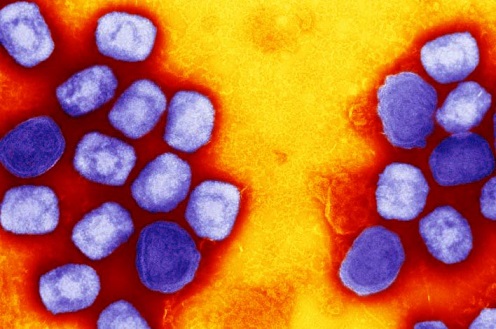Study warns lineage C.1 and B.1.20 of MPox clade 3(2b) are a global threat expanding across species
Nikhil Prasad Fact checked by:Thailand Medical News Team Aug 28, 2024 1 year, 3 months, 4 weeks, 1 day, 7 hours, 57 minutes ago
While the world due to the WHO’s influence is more focused on the Mpox Clade 1b strains that are currently ravaging parts of the African continent but is ignoring the growing spread of the Clade 3 (Also known as clade 2b), often ignorantly terming it as milder or a gay disease, the ongoing evolution of the Mpox virus, particularly within same Clade 3(2b), is raising significant global concerns. Recent studies highlight the rapid spread of lineages C.1 and B.1.20, not only among humans but also across various animal species. Researchers from institutions worldwide, including the Federal Rural University of Pernambuco in Brazil, the University of Ibadan in Nigeria, and the National Research Centre in Egypt, have underscored the potential for these lineages to exacerbate the existing public health crisis. This
Medical News report will explore the critical findings of these studies, emphasizing the urgency of addressing this emerging threat.
 Study warns lineage C.1 and B.1.20 of MPox clade 3(2b) are a global threat expanding across species
The Rise of Clade 3 also known as clade 2b
Study warns lineage C.1 and B.1.20 of MPox clade 3(2b) are a global threat expanding across species
The Rise of Clade 3 also known as clade 2b
The Mpox virus, historically known for its impact on human populations, has shown a concerning ability to adapt and evolve. The recent emergence of Clade 3(2b) has been particularly alarming. This clade, which includes the rapidly spreading lineages C.1 and B.1.20, has demonstrated a capacity to infect both human and non-human hosts, raising the specter of new reservoirs and transmission pathways.
The findings presented here are based on extensive phylogenomic analyses conducted by researchers from various institutions, including the Islamic Azad University in Iran and Stellenbosch University in South Africa.
Global Spread and Species Jump
One of the most striking aspects of the Clade 3(2b) evolution is its ability to jump across species. The C.1 lineage, for instance, has been identified in countries as diverse as Portugal, South Korea, and Japan. Meanwhile, the B.1.20 lineage has predominantly surfaced in the United States, further complicating efforts to contain the virus. These lineages have not only spread geographically but have also shown an alarming ability to infect a broad range of hosts, including rodents and primates.
The study findings suggest that these lineages may have evolved from preexisting sequences, adapting to new environments and hosts with remarkable speed. This adaptability has made them a formidable challenge for public health authorities and researchers alike.
Implications for Public Health
The rapid spread of these lineages poses a dual threat: not only do they increase the risk of human-to-human transmission, but they also raise the possibility of new animal reservoirs. This spillover into animal populations could establish the virus in new ecosystems, making eradication efforts even more challenging.
Researchers from the University of Ibadan and the National Research Centre in Egypt have emphasized the need for enhanced surveillance and a One Health approach to address this threat. The One Health strategy, which integrates human, animal, and enviro
nmental health, is crucial in understanding and mitigating the risks associated with the Mpox virus's continued evolution.
Phylogenomic Insights
The phylogenomic analysis of the Mpox virus has provided critical insights into the mechanisms driving the spread of Clade 3(2b). Lineages C.1 and B.1.20, for example, have shown a high degree of genetic diversity, which has enabled them to adapt rapidly to new hosts and environments. This genetic plasticity is likely a key factor in their global spread and ability to infect multiple species.
The Nextstrain platform, a tool used by researchers to track viral evolution, has played a vital role in monitoring these developments. Data from Nextstrain indicates that the divergence rates of lineages C.1 and B.1.20 are among the highest observed in the Mpox virus, suggesting that these lineages are evolving at a pace that could outstrip current public health interventions.
https://nextstrain.org/mpox/clade-IIb
The Role of APOBEC3
A significant factor in the evolution of these lineages appears to be the activity of the APOBEC3 enzyme family. These enzymes, part of the innate immune system, have been shown to induce mutations in the viral genome, potentially driving the emergence of new, more virulent strains. The study findings suggest that the APOBEC3 enzymes may have played a role in the rapid diversification of Clade 3(2b), particularly in the emergence of lineages C.1 and B.1.20.
This discovery underscores the complexity of the virus's evolution and the challenges it poses to researchers. Understanding the interplay between viral evolution and host immune responses is critical to developing effective countermeasures against the spread of these lineages.
Public Health Response and Future Directions
In light of these findings, the global public health community faces an urgent challenge. The rapid spread of lineages C.1 and B.1.20 requires a coordinated response that includes enhanced surveillance, targeted vaccination campaigns, and robust public health infrastructure.
The One Health approach, which has been advocated by institutions such as the World Health Organization and the Food and Agriculture Organization, must be central to these efforts. By integrating human, animal, and environmental health, this strategy can help mitigate the risks posed by the continued evolution of the Mpox virus.
Conclusion
The study of lineages C.1 and B.1.20 of Mpox Clade 3(2b) highlights the urgent need for global cooperation in addressing this emerging threat. The potential for these lineages to establish new reservoirs and transmission pathways across species underscores the complexity of the challenge.
The study findings were published in the peer-reviewed journal: The Microbe.
https://www.sciencedirect.com/science/article/pii/S2950194624001080
For the latest Mpox News, keep on logging to Thailand
Medical News.
Read Also:
https://www.thailandmedical.news/news/italian-study-finds-that-the-immune-system-relies-more-heavily-on-cd4-t-cells-in-the-fight-against-mpox
https://www.thailandmedical.news/news/who-admits-that-mpox-virus-can-be-spread-through-droplets
https://www.thailandmedical.news/news/monkeypox-mpox-can-cause-a-variety-of-eye-issues-that-can-result-in-vision-loss 